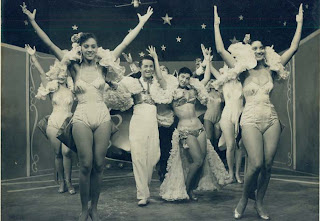Havana, Cuba was Sin City for many Americans for the first half of
the 20th century. Sugar barons, gangsters, dancing girls and spies haunted the
clubs and bars along the the water front.
They say there were more Cadillacs per capita in Havana then anywhere
else on earth. Night spots like Sloppy Joe’s, Floridita and the Tropicana were
household names even in small town America.
The good times rolled faster and longer in Cuba than anywhere else in
the world. It was a hoot, 24 hours a day.
And when it came to music Cuba gave the world the rumba, the chacha,
son and all sorts of jazzy cocktails.
Music was everywhere. In the 5 Stars as well as in the dives. In the
churches and in the streets. Just as
America was making Havana into its own little naughty off-shore play land, Generoso Jimenez, was born in
Ceinfuegos, a town famous for producing numerous famous musicians.
He studied music with his father as a young boy and chose the slide
trombone as his weapon of choice when he joined the local municipal band. He
began developing his unique style in those early years because, the touring
brass bands he played in had few trumpeters and it was left to the trombonists
to do something ‘interesting’ during the breaks.
In Cuba all roads lead to Havana and soon Jimenez was playing the ‘bone in The Tropicana. The top shelf of
American crooners--Sinatra, Nat King
Cole, Cab Calloway--were regular performers and Generoso was always in the show band. After hours he was a regular part of the jam
sessions that could be found all over the city.
In the early 1950’s he joined a new band which was performing a new
crazy rhythm called batanga, in which
a new (to Cuba, if not to Latin America) vocalist named Beny More
was the lead singer. The following year,
1953, More, undoubtedly Cuba’s
greatest singer, asked Jimenez, to manage his huge band as well as
be the main music arranger. In later
years, he led the band for sometime before making his own records, two of which
are highlighted tonight.

This release contains two
sessions from the orchestra of Generoso Jimenez recorded several years apart.
The first album [tracks 13-23] was recorded in 1960. [The record] includes
exquisite versions of of such outstanding songs as Tono Fuentes’ Colombian ‘porro’ La mucura, performed ..in the Cuban
guaracha style with some tasty grooves from the saxophone section and a
magnificent solo by Chocolate Armenteros
Although Ramon Cabrera’s son A la Bahia de Manzanillo,
was immortalized by Beny More, this
instrumental mambo version gives the singer’s classic interpretation a run for
its money with an exciting trumpet, trombone and sax duel.
This release, originally
titled as Ritmo, includes first rate versions of La bamba with its typical rhythm from
Vera Cruz; the rumba Senorita Luna
with a loose arrangement; the Italian song Come prima, heard here in Havana’s
cha cha cha style and many others.
The second session [tracks
1-12] was recorded in 1965 with another brilliant band. The first track is non
other than the outstanding descarga (improvised jam based on a Cuban song) composed
by Generoso and Rolando Baro entitled Trombon majadero. This is followed by the
track Descarga solfeando, another jam by
the trombonist, which contains a
humorous interlude imitating a solfege lesson in the middle of the song. (Liner
notes)
I’ve always been a sucker for good trombone playing and so commend
these two classic Cuban jazz albums to you this Friday evening.
The sound of pre-revolutionary Havana!
Track Listing:
1-01 Trombón Majadero (Descarga)
1-02 Descarga Solfeando (Descarga)
1-03 Jaky Ky (Descarga)
1-04 La Rosa Roja (Chachachá)
1-05 Las Pilanderas (Descarga)
1-06 Ya No Me Quieres (Bolero)
1-07 Garabato (Descarga)
1-08 El Torrente (Mambo Chá)
1-09 La Vieja Rosa (Descarga)
1-10 Uno, Dos y Tres (Conga)
1-11 Llegaron del Otro Mundo (Descarga)
1-12 El Contrabajo Fantasma (Descarga)
2-01 La Bella Cubana (Chachachá) [feat.
Cachao]
2-02 Come Prima (Chachachá) [feat. Cachao]
2-03 La Múcura (Guaracha Porro) (Featuring
Cachao)
2-04 A la Bahía de Manzanillo (Son Mambo)
[feat. Cachao]
2-05 Sueño de Amor (Chachachá) [feat. Cachao]
2-06 Cachita (Rumba) [feat. Cachao]
2-07 La Bamba (Bamba) [feat. Cachao]
2-08 Señorita Luna (Rumba) [feat. Cachao]
2-09 Besitos de Coco (Merengue) [feat. Cachao]
2-10 El Tambor de la Alegría (Tamborito)
[feat. Cachao]
2-11 Maracaibo Oriental (Son Montuno) [feat.
Cachao]
















